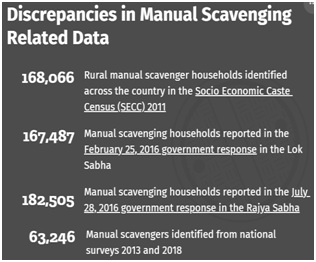

Context
Despite the Prohibition of Employment as Manual Scavengers and their Rehabilitation Act, 2013 (MS Act, 2013), which prohibits the practice of manual scavenging, it is prevalent across the country.
Background
- In a latest development, the government informed Parliamentthat it has been “able to achieve the target of abolition of manual scavenging” as per the prescribed definition under the law.
- However, the reality is different.
- This is far from reality as manual scavengers in the country are not only working as contractual, migrant and casual workers and labourers but also as bonded labourers in Jharkhand, Maharashtra, Odisha, Tripura and Bihar.
- Jharkhand, with 763 manual scavengers working as bonded labour — the highest in India — puts the new labour codes to shame.
- Over 30,356 children in the state still work as labour engaged in direct scavenging; sweeping; railway track, sewer and septic tank cleaning; and assisting jobs.
Analysis
What is manual scavenging?
- Manual scavenging in India is officially defined as ‘lifting and removal of human excreta manually’, at private homes and toilets maintained by municipal authorities.
- As per the “Prohibition of Employment as Manual Scavengers and their Rehabilitation Act, 2013 (MS Act, 2013)” manual scavenging means manually cleaning, carrying, disposing of, or handling in any manner, human excreta in an insanitary latrine.
- It is prohibited with effect from December 2013.
- Commonly associated people: Dalit men and women (of various sub-castes, most notably Valmiki).

|
Threats
|
Who is to be blamed?
- Poor governance: The blame, first and foremost, should lie on the governing structure of the governments.
|
- Unequal social structure: Indian society’s deeply unequal social structure based on caste hierarchy and patriarchy is equally culpable.
- The rich segment: Moreover, the moral culpability equally lies with the ‘neo-middle’ and other affluent classes who have been so engulfed in their own lives that they do not care about the issue or question the government and ensure accountability.
- Media: The media too can be blamed, for not giving adequate importance to social issues such as manual scavenging.
Government measures to end the practice
- Prevention of Atrocities Act: In 1989, the Prevention of Atrocities Actbecame an integrated security guard for sanitation workers; more than 90% of the people employed as handicraftsmen belong to Organized Caste.
- Manual Scavengers and the Construction of Dry Latrines (Prohibition) Act: In 1993, the Government of India introduced the Manual Scavengers and the Construction of Dry Latrines (Prohibition) Actprohibiting the hiring of hand-operated scavengers to clean dry toilets and the construction of flush toilets.
|
Dry Latrines in India
|
- The Prohibition of Employment as Manual Scavengers and their Rehabilitation Act, 2013prohibits the construction or maintenance of unhygienic toilets, and the hiring of any person by hand cleaning or hazardous cleaning of sewer pipes and swimming pools.
- Article 21: The Article guarantees the ‘Right to Life’ and also with dignity.
- Swachh Bharat Abhiyaan (Clean India initiative)
- Safaimitra Suraksha Challenge
- Swachhta Abhiyan App:It has been developed to identify and geo-tag the data of insanitary latrines and manual scavengers so that the insanitary latrines can be replaced with sanitary latrines and rehabilitate all the manual scavengers to provide dignity of life to them.
|
Sewer-cleaning robots and machines such as the Bandicoot are slowly making their way to different municipalities and local authorities. |
What measures are required?
To assume that a ban on paper would abolish a centuries old practice, deeply vested in caste discrimination, is naive. The government with a strong will need to take the following measures:
- Education: educating communities against this dehumanizing practice
- Strict action: strict enforcement of criminal penalties
- Financing: a genuine financial commitment to overcome the technological barriers
Concluding thoughts
In a democracy like India, the existence of manual scavenging is a “national shame“, and a blot on the idioms of social, economic and political justice mentioned in the Indian constitution and a contemporary form of slavery. The manual carrying of human faeces is not a form of employment, but an injustice akin to slavery.
This situation needs to be corrected immediately. At first, the government should come up with the right data about the degree of its persistence. Afterwards, effective steps must be taken to tackle the issue with the required force.



